Whether you're grilling chicken, beef, or vegetables, the right seasoning is key to delicious results. In this guide, we'll show you exactly how to choose and use the best spices for every type of protein and veggie, with expert tips for perfect flavor every time.
Discover the top 10 essential BBQ spices, how to use them like a pro, perfect meat pairings, and DIY recipes to elevate your grilling game. Let's get started!
Table of Contents
- BBQ Spice Essentials: The Top 10 You Need
- How to Use Each Spice Like a Pro
- Spice & Meat Pairings: Flavor That Makes Sense
- Seasoning Veggies? Yes Please!
- Buying Guide: What to Look For in Quality BBQ Seasoning
- DIY Blends: Customize Your Own BBQ Seasoning
- Frequently Asked Questions About BBQ Seasoning
- Conclusion
BBQ Spice Essentials: The Top 10 You Need
Before we dive into techniques and combinations, let's lay down the basics — the core spices that should live on every BBQ lover's shelf:
- Paprika – Smoky, sweet, and earthy
- Cumin – Warm, nutty, and bold
- Garlic Powder – Savory depth in a bottle
- Onion Powder – Adds sweetness and bite
- Chili Powder – A blend with heat and flavor
- Black Pepper – Earthy spice that boosts all flavors
- Brown Sugar – Sweetness that balances smoke and spice
- Salt – Enhances everything
- Smoked Sea Salt – For a deep, rich finish
- Cayenne Pepper – If you like it hot
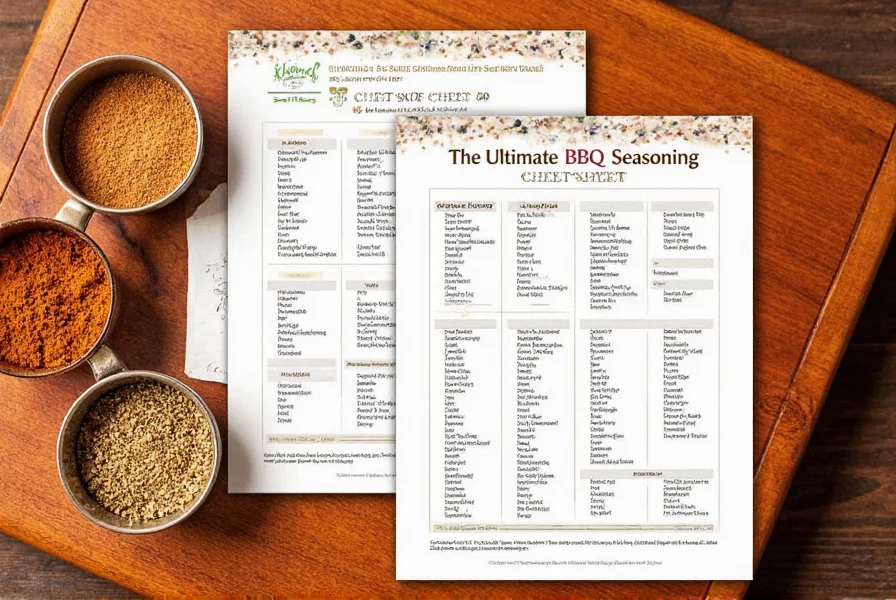
How to Use Each Spice Like a Pro
Knowing what spices to use is one thing — understanding how and when to apply them is where the magic happens. Here's a breakdown of how to use each of these key ingredients to maximize flavor:
| Spice | Flavor Profile | Best For | Usage Tip |
|---|---|---|---|
| Paprika | Earthy, sweet, slightly smoky | Brisket, chicken, dry rubs | Use smoked paprika for extra depth |
| Cumin | Nutty, warm, peppery | Beef ribs, pulled pork | Toasting before grinding enhances flavor |
| Garlic Powder | Concentrated garlic flavor | Steak, burgers, marinades | Avoid overuse; too much burns easily |
| Onion Powder | Mellow, sweet, pungent | Ribs, sausage, grilled veggies | Add early to allow flavor to develop |
| Chili Powder | Smoky, spicy, aromatic | Tex-Mex BBQ, chili, rubs | Choose quality blend or make your own |
| Black Pepper | Sharp, earthy | All meats and sauces | Use freshly ground for maximum aroma |
| Brown Sugar | Sweet, caramelized | Pork shoulder, ribs, glazes | Balance with salt and heat |
| Salt | Essential flavor enhancer | All meats and sides | Kosher salt preferred for texture |
| Smoked Sea Salt | Intense, savory smokiness | Finishing touch on steak or salmon | Use sparingly after cooking |
| Cayenne Pepper | Hot, sharp, bright | Spicy rubs, sauces, wings | Blend with cooling agents like yogurt |
Spice & Meat Pairings: Flavor That Makes Sense
Matching the right seasoning to your protein isn't guesswork — it's science! Here are some tried-and-true combos that will take your BBQ game to the next level:
- Brisket + Paprika, Black Pepper, Garlic Powder: Low and slow meets bold and beefy.
- Pulled Pork + Cumin, Brown Sugar, Chili Powder: Sweet, smoky, and perfectly balanced.
- Chicken Wings + Cayenne, Garlic, Salt: Fiery and flavorful without overpowering.
- Grilled Salmon + Smoked Sea Salt, Lemon Zest, Dill: Sophisticated yet simple.
- Lamb Chops + Cumin, Coriander, Black Pepper: Mediterranean flair meets Southern smoke.
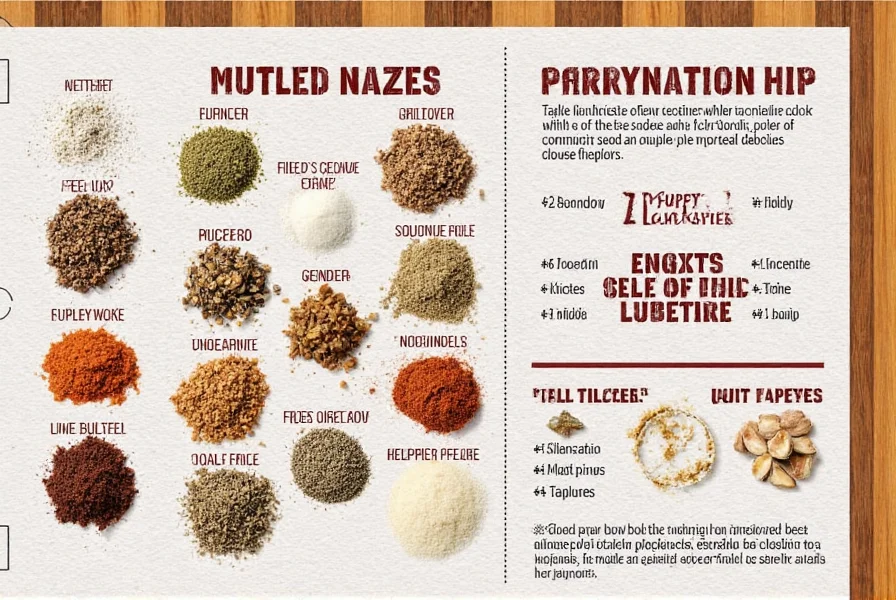
Seasoning Veggies? Yes Please!
Who says barbecue is only for carnivores? Grilled vegetables can be just as delicious — if you season them right. Here's how to bring out their natural flavors with spice:
- Asparagus: Toss with olive oil, sprinkle with sea salt, black pepper, and lemon zest.
- Zucchini/Squash: Rub with onion powder, smoked paprika, and a dash of cayenne.
- Corn on the Cob: Brush with butter, sprinkle with chili powder, lime juice, and cotija cheese (optional).
- Eggplant: Drizzle with olive oil and sprinkle za'atar, smoked salt, and crushed red pepper flakes.
- Mushrooms: Marinate in soy sauce, garlic powder, and sesame oil before grilling.

Buying Guide: What to Look For in Quality BBQ Seasoning
With so many options lining store shelves, choosing the right seasoning can feel overwhelming. Here's a quick buyer's guide to help you pick the best:
1. Check the Ingredients List
- Avoid fillers like anti-caking agents or artificial additives.
- Look for real spices — whole or freshly ground, not synthetic flavorings.
2. Opt for Freshness
- Buy from reputable brands or local spice markets with high turnover.
- Check for expiration dates — spices lose potency over time.
3. Consider Region-Style Blends
- Texas-style: Simple, coarse salt and pepper.
- Kansas City: Tomato-based, sweet and smoky.
- Carolina: Vinegar-forward with mustard or pepper kick.
- Memphis: Dry rubbed with paprika, garlic, and cumin.
- Texas-Mex: Bold with chili, cumin, and smoked flavors.
4. DIY vs. Store-Bought
- Store-bought: Great for convenience and consistency.
- DIY: Offers customization, freshness, and fun experimentation.
Top Brands to Consider
| Brand | Features | Best For |
|---|---|---|
| Badia | Authentic Latin American spices, affordable | Mexican-inspired BBQ dishes |
| McCormick | Widely available, consistent quality | Beginners and casual cooks |
| Spice Islands | Whole spices, minimal processing | Chefs and home cooks who prefer fresh grinding |
| Trader Joe's | Unique blends, budget-friendly | Weekend warriors and curious foodies |
| Spicewalla | Chef-curated, premium ingredients | Pro-level cooks and gifting |
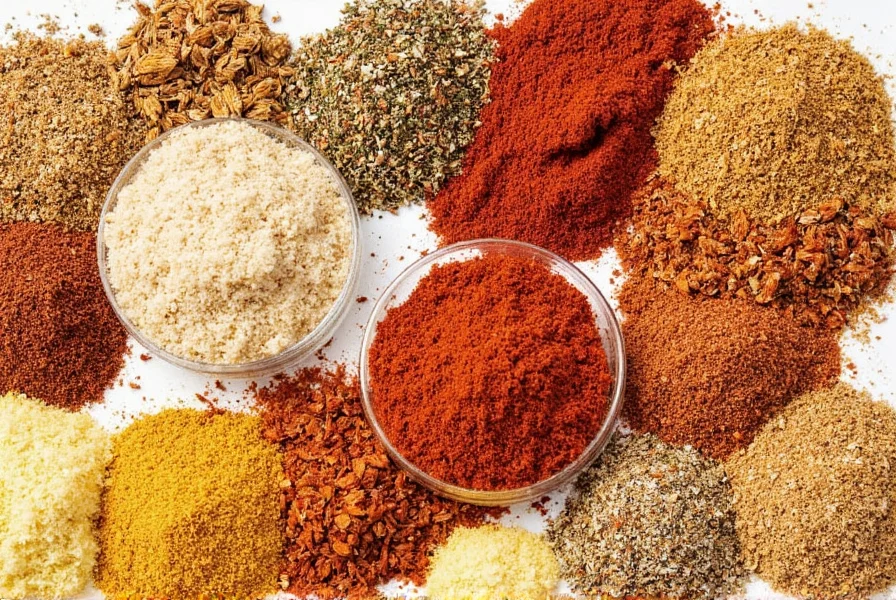
DIY Blends: Customize Your Own BBQ Seasoning
If you're feeling adventurous, making your own seasoning blends allows you to tailor the taste exactly to your liking. Here are three popular BBQ blends you can whip up at home:
1. Classic Texas Rub
- 2 tbsp coarse sea salt
- 2 tbsp black pepper
- 1 tbsp garlic powder
- 1 tbsp onion powder
- 1 tsp smoked paprika
Use On: Brisket, ribeye steaks, and other beef cuts.
2. Carolina Gold Dry Rub
- 3 tbsp brown sugar
- 2 tbsp mustard powder
- 1 tbsp paprika
- 1 tsp celery salt
- ½ tsp cayenne pepper
Use On: Pulled pork, turkey breast, and grilled chicken.
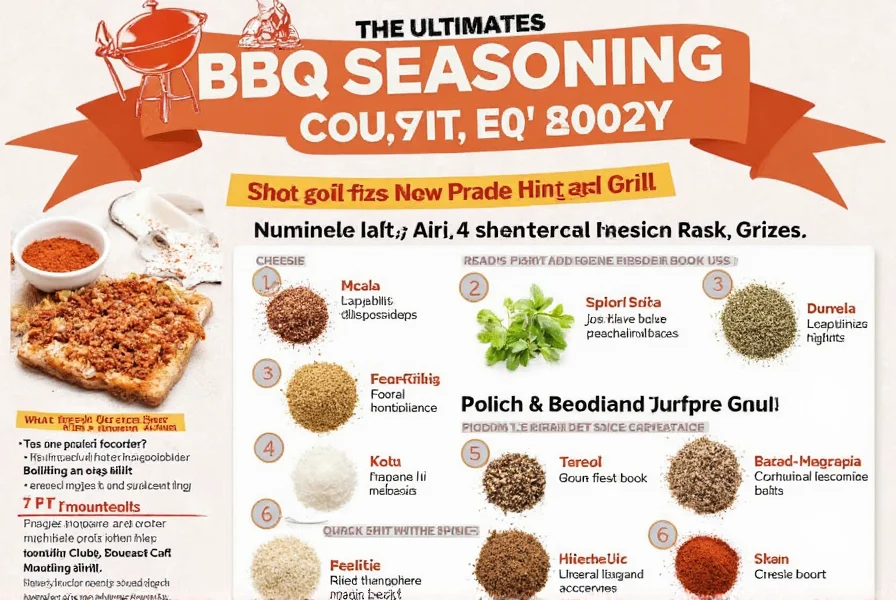
3. Tex-Mex Fiesta Blend
- 2 tbsp chili powder
- 1 tbsp cumin
- 1 tbsp smoked paprika
- 1 tbsp garlic powder
- 1 tsp oregano
- ½ tsp cayenne
Use On: Beef tacos, grilled shrimp skewers, fajitas, and more.
Frequently Asked Questions About BBQ Seasoning
How much seasoning should I use for BBQ?
The general rule is 1 tablespoon of dry rub per pound of meat. However, this depends on personal preference and the specific recipe. For beginners, start with less and gradually increase. Remember that salt is the most important component for flavor enhancement, but be careful not to overdo it. For vegetables, use about half the amount you'd use for meat since they're more delicate.
When is the best time to apply seasoning to my meat?
For best results, apply dry rubs at least 1-2 hours before cooking, or even overnight for thicker cuts. This allows the flavors to penetrate the meat. For salt specifically, many pitmasters recommend salting at least 40 minutes before cooking (or up to 24-48 hours for large cuts like brisket) to allow it to dissolve and be absorbed. Avoid applying wet marinades too far in advance as they can break down the meat's texture. For quick-cooking items like chicken breasts or burgers, 30 minutes to 2 hours is sufficient.
Can I use the same seasoning for both meat and vegetables?
Absolutely! Many basic seasoning components like salt, pepper, garlic powder, and paprika work well for both. However, vegetables often need less salt and sometimes benefit from lighter flavors. For example, while a beef brisket might handle a robust rub with cumin and chili powder, zucchini might shine with just olive oil, salt, pepper, and a touch of lemon zest. The key is to adjust the intensity based on what you're cooking - vegetables generally need more delicate seasoning than meat.
How long does homemade BBQ seasoning last?
Properly stored homemade BBQ seasoning typically lasts 6-12 months. Store it in an airtight container in a cool, dark place away from heat and moisture. Whole spices last longer than ground ones, but since most BBQ seasonings use ground spices, 6 months is a good guideline for peak flavor. You'll know it's lost potency when the aroma fades or the color becomes dull. Adding a silica packet to your container can help extend shelf life by absorbing moisture. For maximum freshness, make smaller batches that you'll use within a few months.
What's the difference between dry rubs and marinades for BBQ?
Dry rubs are primarily salt and spices applied directly to the surface of meat, creating a flavorful crust as it cooks. They work by drawing out moisture initially, then forming a delicious bark. Marinades are liquid-based mixtures containing acid (like vinegar or citrus), oil, and seasonings that both flavor and tenderize meat through enzymatic action. Dry rubs are better for low-and-slow cooking where you want that signature bark, while marinades work well for quicker cooking methods or tougher cuts that need tenderizing. Many pitmasters use both - a dry rub for flavor and a light spritz or mop during cooking for moisture.
Should I use kosher salt or regular table salt for BBQ seasoning?
Kosher salt is generally preferred for BBQ seasoning for several reasons: its larger crystals provide better control when seasoning by hand, it's free of additives like iodine that can create off-flavors, and it dissolves more slowly which helps with even distribution. The flat flakes of kosher salt (particularly Diamond Crystal brand) adhere better to meat surfaces. If using table salt, reduce the amount by about 25-30% since it's denser and more concentrated. For finishing touches after cooking, many pitmasters prefer flaky sea salts like Maldon for their texture and burst of flavor.
Conclusion
Mastering the art of using the right BBQ seasoning is like unlocking a secret level in your grilling game. With the right combination of salt, spice, and heat, you can turn even the most humble cut of meat into something unforgettable. Remember, seasoning is more than just slapping on some salt and pepper — it's about layering flavors, knowing your spices, and matching them wisely to your protein and occasion.
So whether you're sticking to classic blends, experimenting with global flavors, or creating your own signature mix, keep these tips in mind:
- Balance sweetness, heat, and salt
- Toast whole spices for deeper flavor
- Apply seasoning ahead of time for better absorption
- Don't forget your veggies!
- Always taste as you go
Now go forth, season boldly, and make your next BBQ a feast to remember.
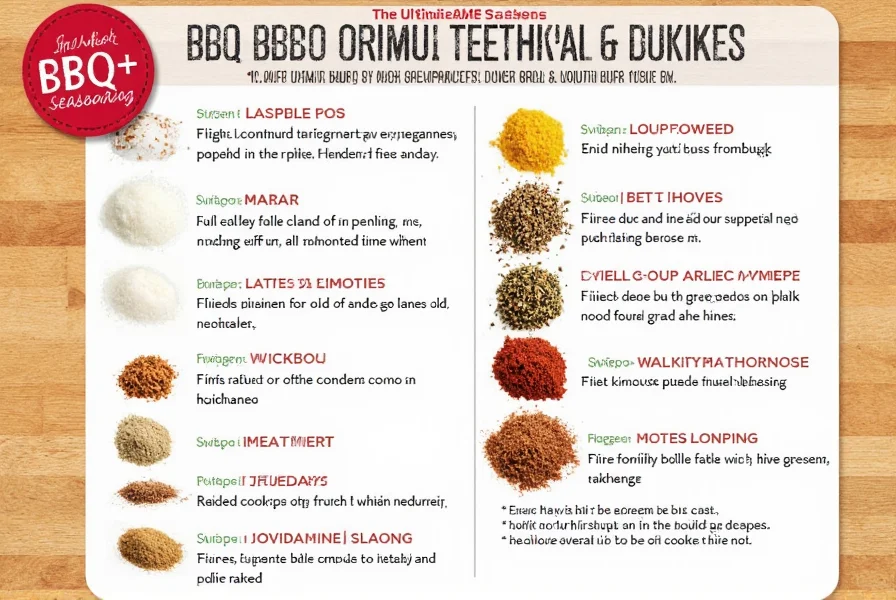

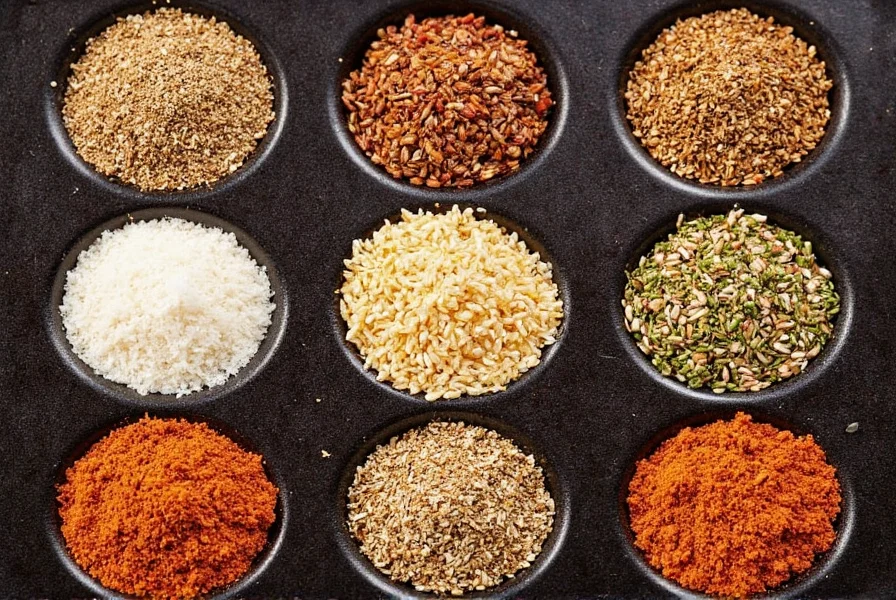









 浙公网安备
33010002000092号
浙公网安备
33010002000092号 浙B2-20120091-4
浙B2-20120091-4